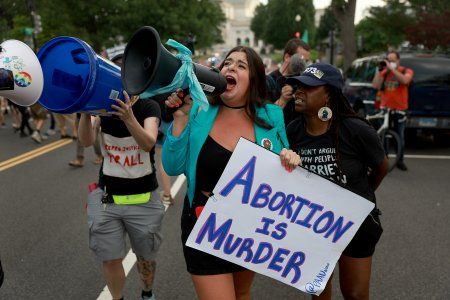Roe v. Wade Being Overturned Could See IVF Banned in at Least 30 States
The potential overturn of Roe v. Wade by the Supreme Court could have ramifications wider than just banning abortion in much of the United States. In a post-Roe world, in vitro fertilization (IVF)—the fertility treatment used by millions of Americans every year—could be in danger.
A Supreme Court draft opinion leaked by Politico in May revealed that a majority of justices supported overturning Roe, the landmark 1973 case that guaranteed access to abortion nationwide. Abortion-rights activists were outraged at the potential overturn that would immediately make abortion illegal in 13 states and potentially lead to bans across the nation.
Along with being catastrophic for people trying to terminate their pregnancy across much of the country, the consequences of the Supreme Court striking down Roe v. Wade could be just as dramatic for those trying to have a baby through assisted reproductive technology like IVF.
With IVF, it's common practice to fertilize more than one egg to maximize the chances of the process being successful, though normally only one embryo is returned to the woman's womb to grow and develop. The other fertilized eggs are discarded.

Would this be considered homicide in a state that has banned abortions under any circumstances? The answer to this question is unclear.
There's uncertainty around how IVF is legally defined, and whether each state considers a fertilized egg as a human being with rights or not. Many of the 13 states with trigger laws that would immediately ban abortion rights once Roe is overturned—Arkansas, Idaho, Kentucky, Louisiana, Mississippi, Missouri, North Dakota, South Dakota, Oklahoma, Tennessee, Utah, Wyoming and Texas—define life as beginning at "the moment of fertilization."
There is widespread concern that more states might introduce "personhood" laws if Roe is overturned, making IVF treatments no longer possible.
Power, a group promoting clinical trials, conducted a survey among over 1,000 women in the U.S. who are currently trying or have tried to have a baby in the past year. It found that Google searches for "IVF Ban" are now up to 1,446 percent since the beginning of May, when the Supreme Court draft opinion was leaked.
According to Power, the birth of 50,000 babies in the U.S. is the result of successful IVF treatments every year.
Research conducted by Power and the Guttmacher Institute, an abortion-rights research organization, shows that as many as 30 states and more could ban IVF if Roe is overturned: Alabama, Alaska, Arizona, Arkansas, Florida, Georgia, Idaho, Indiana, Iowa, Kansas, Kentucky, Louisiana, Montana, Nebraska, New Mexico, Michigan, Minnesota, Mississippi, Missouri, New Hampshire, North Carolina, North Dakota, Oklahoma, Pennsylvania, South Carolina, South Dakota, Tennessee, Texas, Utah, Virginia, West Virginia, Wisconsin and Wyoming.
Oklahoma already signed the country's strictest abortion ban in May, stating that life begins at fertilization. The bill defines an "unborn child" as "a human fetus or embryo in any stage of gestation from fertilization until birth."
In the same month, Louisiana's state house committee tried to advance a bill that would define personhood as beginning from the moment of fertilization. The legislation was scrapped by Louisiana lawmakers after much controversy. Louisiana has already a trigger law that will ban abortion the moment Roe is overturned.
In these states, Power says that extra embryos would likely have the right to life after Roe is overturned, meaning that the woman undergoing IVF might have to carry every embryo to term instead of discarding or donating them, as typically occurs.
The National Conference of State Legislatures (NCSL) says that currently, at least 38 states have fetal homicide laws: Alabama, Alaska, Arizona, Arkansas, California, Florida, Georgia, Idaho, Illinois, Indiana, Kansas, Kentucky, Louisiana, Maryland, Massachusetts, Michigan, Minnesota, Mississippi, Missouri, Montana, Nebraska, Nevada, New Hampshire, North Carolina, North Dakota, Ohio, Oklahoma, Pennsylvania, Rhode Island, South Carolina, South Dakota, Tennessee, Texas, Utah, Virginia, Washington, West Virginia and Wisconsin.
At least 29 of these states have fetal homicide laws that apply to the earliest stages of pregnancy, which include "any state of gestation/development," "conception," "fertilization" or "post-fertilization."